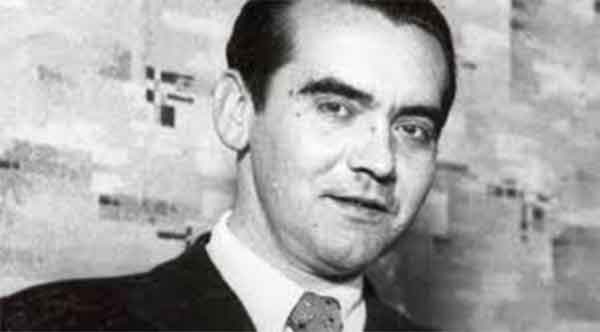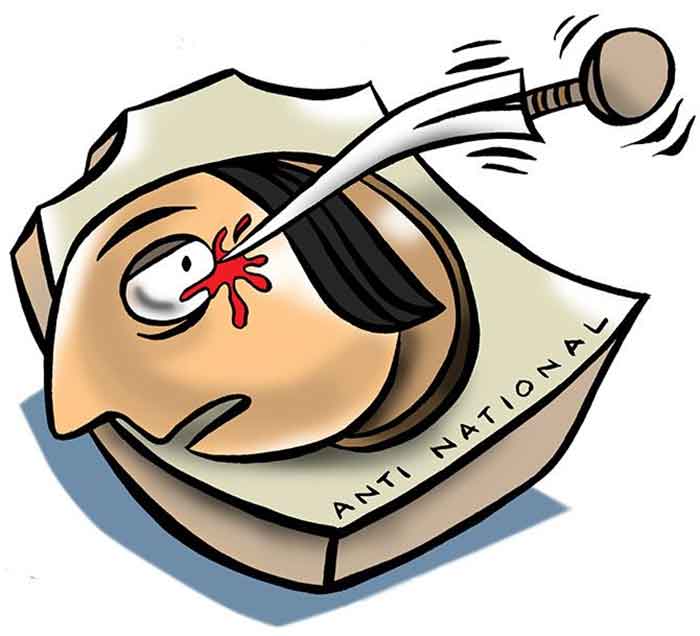
About 85 years ago, Spanish fascists murdered Federico Garcia Lorca (1898 – 1936), the most important Spanish dramatist of the twentieth century who said “Spain is the only country in the world where death is a national spectacle.”
Some 35 years ago, a young woman named Roop Kanwar was burnt alive by her in-laws and village elders on her dead husband’s pyre at Deorala in Rajasthan, in the name of tradition and a wife’s duty. Even the victim’s brothers justified the act.
The denunciation in October, 2007 by Spain’s lower house of parliament of General Franco’s regime might have come decades too late, but the fact is that here was a desire on the part of Spanish law-makers to set right the horrendous wrongs dating back to the 1930s. In the landmark 2007 vote, local governments were asked to unearth mass graves from the 1936-39 civil war; remove all Franco-era symbols from streets and buildings; and declare as ‘illegitimate’ all summary military trials that led to the execution of hundreds of thousands of Spanish citizens with Republican sympathies.
It is necessary to mention that from July 1936 to the end of the mass executions in 1944, Franco’s hordes shot 300,000 to 400,000 fellow-Spaniards, accusing them of conspiring to destroy the Spanish State and society by promoting anarchy and godlessness. The civil war produced a ‘breakdown of restraint such as had not been seen in Europe since the Thirty Years’ War’, wrote Hugh Thomas in his important book, The Spanish Civil War.
Unlike what happened in Spain in 2007, the murder by fire of Roop Kanwar is made out to be an act of great holiness till today. Those who are most vociferous in this regard are people born and raised under the poisoned shadow of the so-called Sangh Parivar or the saffron brigade. Roop Kanwar is hailed as a Sati Mata and the site of her forced immolation is worshipped as ‘pavitra sthal’ (sacred ground). She is held up as an example for every loyal and loving Hindu wife to follow unquestioningly. All this despite there being in existence a law that forbids the glorification of Sati in any way.
On July 30, 2011 a curious incident took place in one of Calcutta’s best-known cultural centers – The Goethe Institute – Max Mueller Bhavan. Tarun Vijay, a national spokesperson of the Bharatiya Janata Party, was in attendance to participate in a discussion with the reputed filmmaker and activist, Anand Patwardhan, following a screening of his documentary Ram ke Naam (In the Name of God, 1990). Tarun Vijay began his address saying how happy he was to be in Calcutta at a time when West Bengal had just experienced a political parivartan (change) and Mamata didi (elder sister) had come to power after a very long spell of CPIM rule. Soonafter, he began inflicting on the audience a barrage of the most reactionary and objectionable Hindutva rhetoric. In between he called the critically acclaimed and much awarded film, a piece of ‘trash’ and characterized its director as someone whose purpose was to spread hate.
Tarun Vijay had to come from another planet not to realize that the mood of the largely youthful audience was gradually turning from amused indulgence to explosive anger. And explode it did when with an air of triumph he sought to march out of the auditorium without bothering to wait and hear out Patwardhan’s reply, or take questions from the floor. More than one agitated member of the audience stood up to block the BJP man’s way and literally forced him back to the podium with the admonition that in deference to democratic practice, he would be allowed to leave only after answering the doubts and queries of the listeners.
The thing to note was that all this while, Patwardhan either kept silent when unparliamentary language was being freely pelted at him, or tried to engage Tarun Vijay in a civilized and meaningful discourse on what Ram ke Naam had to say on the Babri Masjid – Ram Janmabhoomi issue.
Sensing the mood in the auditorium, the saffronite not only meekly walked back to his seat but even did a volte face calling Patwardhan ‘a man of peace’. Everyone was left wondering about how with just a little Gandhian pressure, the stormtrooper can be made to behave as he should have in the first instance. Perhaps the lesson here is that the moronic and the murderous are often allowed to have their way in our besieged society because the majority chooses to look the other way when it should be ready to stand up and be counted.
To go back to the man’s first sentence celebrating the fall of the CPIM in Bengal, the fundamentalist in him made the fundamental mistake of equating a change in regime with what in all likelihood struck him as the disappearance of the Left sentiment from the living culture and hidden soul of Bengal. In his ignorance combined with spite, he confused the CPIM with the Left, which is a much broader, deeper, higher, older and nobler reflection of political thought and social behavior in Bengal. Many of the young or middle-aged who stood up to Tarun Vijay’s mindless mudslinging may well have voted for Trinamul Congress or the Indian National Congress in the April-May elections, but that vote hardly meant that they had banished the Left from their heart or their imagination; that they wanted social obscurantism, unrestrained capitalism or rank opportunism to become the order of the day.
Lorca died at the hands of misdirected ideologues and their hatchetmen whose prejudices, cruelties and methods of elimination of opponents bore uncanny resemblance to what leaders and cadres of the unfortunately-named Sangh Parivar are given to saying and doing without remorse. (I say unfortunately-named because, like millions of others in this country, to me parivar, meaning family, denotes togetherness, inclusiveness, love and concern for all members.)
Lorca’s plays, especially the famous trilogy – Bodas das Sangre (Blood Wedding, 1933), Yerma (1934), and Casa da Bernarda Alba (House of Bernarda Alba, 1936) – have greatly influenced many creative souls all over the world who read in patriarchy many crimes against humanity. Fashioning his Rukmavati ki Haveli (1990) on Bernarda Alba, filmmaker Govind Nihalani transported his viewers to a village in Rajasthan at the beginning of the twentieth century. After Rukmavati’s husband dies, she decrees a five-year period of mourning for the family, which means wearing of black and cessation of all social intercourse. But her five young daughters, like their Spanish sisters in the Lorca original, can barely take the renunciation. With the moon in their eyes and horses in their limbs, they restlessly pace about the chambers and courtyard of the haveli, like dark, doleful phantoms. In the end, as passion and the seething will to live get the better of matriarchal exhortations to class, ‘honour’ and tradition in an insufferable feudal ambience, tragedy shatters the unquiet silence of mourning. But even as her youngest daughter hangs herself after a nocturnal tryst with an unseen stranger, Rukmavati declares: “My daughter died a virgin”. Which is a lie, a lie as pathetic and powerless as a host of other lies produced by authoritarianism and a heartless defiance of Nature.
Nihalani’s treatment of a theme as old as womankind and yet as new as contemporary inroads into the Indian ethos in the name of history, heritage and the like, deserves to be witnessed and discussed anew. It is doubtful whether the filmmaker could have chosen a more appropriate setting than Rajasthan, epitomizing as it does, cruelty and chicanery when its former rulers, landed gentry and other privileged classes talk of chivalry and courage. The high-strung persona and blighted throw-back philosophy of Rukmavati can destroy not just a family but an entire community or even a whole country. While critiquing the policing mentality of tyrants, big and small, Rukmavati ki Haveli conveys a warning against those elements in the Indian polity who would want to arrest the march of history for their own narrow gains. Such elements, once strong in the Hindi-speaking heartland but now given to flexing their muscles in previously untouched territories, would think nothing of setting the clock of civilization back, all the while chanting seductive mantras like, “The glory that was once ours”.
(One daresay that Rukmavati would have wholeheartedly approved of the conferment of a bogus divinity/sainthood on young Roop Kanwar.)
Lorca suffered a violent end when he was not yet 40 because he saw through the absurdities and cruelties of the politics of status quo, expressing himself memorably in poems, plays and other writings. These were characterized by a quiet outrage against feudalism, ultra-religiosity and militarism. In one and the same breath he alienated the Catholic Church, the landed aristocracy and the Spanish army – a more lethal combination of reactionary forces would be difficult to imagine. In continuing to recall Lorca 85 years after his assassination, people all over the world honour the profound ideas he expressed with poetic fervor, and the shining ideals for which he perished.
It is not difficult to follow why Lorca seems especially relevant to contemporary India. The rhetoric of reaction that has come to grip a sizeable section of Indians today, promises instant retribution to anyone opposing its inherent shortsightedness.
Patriotism, overdone, has been a safe and profitable refuge for many a scoundrel. Bertrand Russell was proved correct when he held this position during the War years, but not without causing himself considerable trouble at the hands of British hawks and warmongers. In more recent times, the late scholar and educationist Edward Said had articulated the same point of view in many of his distinguished speeches and writings. Addressing students and teachers of JNU and Delhi University some years before his untimely end, Said made many friends and not a few enemies when he dismissed current notions of patriotism. He was categorical that societies tolerant of hyper-patriotism have paid a heavy price by passing into the sedulous embrace of obscurantists and fundamentalists.
Lorca was a patriot to the extent to which his poet’s instinct and lyrical temperament, his social conscience, and his understanding of the political realities of the day allowed him to be. He loathed fanaticism, which many make the mistake of construing to be their duty to their country and people. Judging by the way things are shaping up in the hands of ultra-nationalists in power, aided and abetted in their designs by opportunists and hangers-on belonging to dubious regional outfits, there is an important lesson for Indians here, which they may fail or refuse to acknowledge at their own peril.
Lorca’s good friend Luis Bunuel was to say some years after the former’s death: “In a world as badly made as ours, there is only one road open – rebellion”. The rebellion that one of the greatest figures in the history of cinema mentions can take many shapes. History caught up with Franco when a large number of Spanish parliamentarians chose to be rebellious in a democratic way and voted to dig out the country’s dictatorial past. Likewise, history is sure to catch up, if not today then certainly someday in the near future, with the Advanis and the Joshis, for their heinous deeds in Ayodhya and elsewhere. Not all their spokesmen will be able to do anything to save them once a touch of the rebellious comes to ennoble the collective Indian soul.
( Vidyarthy Chatterjee writes on cinema,society, and politics.)
SIGN UP FOR COUNTERCURRENTS DAILY NEWSLETTER















































